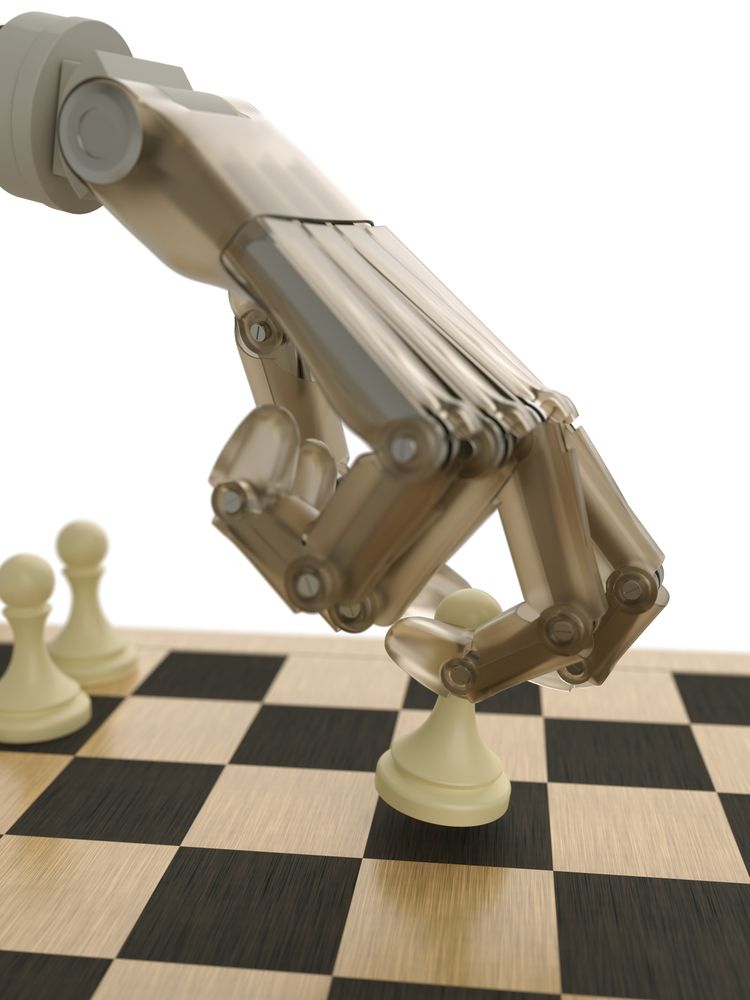
Could A Chess Computer Take Over The World?
Chess-playing computers are almost unfathomably strong, and they are improving faster than even the best human players.
Three months ago, we took a look at the top five computer chess engines, and today the best two programs on that list, Komodo and Stockfish, are significantly better at chess then they were in the spring.
This sort of competitive development is unlikely to slow down any time soon, and further advances in computer hardware and software certainly mean that tomorrow’s chess engines will be even stronger than today’s.
But as well as the machines play now, they are still dependent on human programmers and chess instructors to “teach” them how to play. Even though top-level engine games may seem inscrutable and other-worldly, they are the predictable results of each engine’s human-guided programming.
We know how today’s chess computers evaluate positions, and as complicated as an engine’s algorithms may be, it all boils down to simple math in the end. We understand the input (the moves played), we understand the output (the engine’s evaluation), and — most important — we understand the engine’s inner workings, how it arrived at the output.
After all, we taught it how to play.

There is, however, computer software that approaches problem-solving much differently. Using a programming method called genetic algorithms, a computer can generate optimized solutions by mimicking the process of natural selection in its virtual environment.
The result, says the computer science author James Barrat, is a computer with accurate and useful output, but whose inner workings are beyond the understanding of its human programmers. Such “black box” systems are already being used to solve various problems where trial-and-error yields good results — computer scientists from Google and Cal-State Sacramento, for instance, created a genetic algorithm computer to play the notoriously difficult sprinting game QWOP.
So what does this mean for chess? Barrat wrote a book about the future implications of artificial intelligence, Our Final Invention, where he argues that genetic programming might be one of the foundations for a computer learning to teach itself. An advanced machine whose genetic origins are not understood by its human programmers would be fundamentally unknowable if it became self-improving or even self-aware, he says.
If that’s the future of advanced computing, of course it will be used to play chess. In his book, Barrat interviewed the computer science professor Steve Omohundro, who cites chess as a typical application for which human scientists might create a self-improving machine — a machine whose inner workings and ultimate goals would be completely alien to us and potentially uncontrollable.
According to Omohundro:
Surely no harm could come from building a chess-playing robot, could it?… such a robot will indeed be dangerous unless it is designed very carefully. Without special precautions, it will resist being turned off, will try to break into other machines and make copies of itself, and will try to acquire resources without regard for anyone else’s safety.
These potentially harmful behaviors will occur not because they were programmed in at the start, but because of the intrinsic nature of goal driven systems.
Excerpt from James Barrat, Our Final Invention.
Barrat then asked Omohundro how a mild-mannered chess computer could possibly pursue any goal outside the 64 squares of the chessboard.
Omohundro lays out this scenario:
Okay, let’s say it just played its best possible game of chess. The game is over. Now comes the moment when it’s about to turn itself off. This is a very serious event from its perspective because it can’t turn itself back on. […] It will wonder, "Did I really play that game? What if somebody tricked me?"
Maybe it thinks it should devote some resources to figuring out these questions about the nature of reality before it takes this drastic step of shutting itself off. Barring some instruction that says don’t do this, it might decide it’s worth using a lot of resources to decide if this is the right moment […]
It might decide it’s worth using all the resources of humanity.
Excerpt from James Barrat, Our Final Invention.
Obviously, a chess engine taking over the world to make sure it played the best-possible game of chess is a far-fetched scenario, more of a thought experiment than something to worry about.

But the idea of a seemingly harmless subject like a chess game spiraling out of control when introduced to a self-improving computer is something computer scientists need to keep in mind when designing the forerunners of tomorrow’s increasingly intelligent computers.
As for chess engines, there is no question they will continue to improve. They might seem to play perfectly now, but studies of how the top engines handle seven-piece endgames (where perfect play is known) have shown there is tremendous room for improvement even for the computer engines.
Stay tuned to Chess.com for the latest news in computer chess, and for some great upcoming events where man will face the machines (albeit with far lower stakes than the fate of the world).
Until then, enjoy our report on the "cyborg" Hikaru Nakamura, who played against Stockfish with the help of an older, weaker chess engine.
Do you think a chess computer could ever take over the world?
Let us know in the comments or on Facebook.






